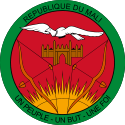- Constitution of Mali
-
Mali 
This article is part of the series:
Politics and government of
Mali- Constitution
- President
- Prime Minister
- Council of Ministers
- National Assembly
- Speaker
- Elections:
- Political Parties
- Regions
- Cercles
- Arrondissements
- Communes
- Foreign relations
- Foreign aid
- Human rights
The 1992 Constitution of Mali was approved by a referendum on 12 January 1992 after being drawn up by a national conference in August 1991. The constitution provides for multi party democracy within a semi-presidential system.[1]
Contents
Background
The original Malian constitution was abrogated on 6 December 1968 after a military coup d'etat and replaced by a new fundamental law.[2] A new constitution adopted in 1974 after a referendum on 2 June 1974 created a one party state while moving the state from military rule.[3] This constitution lasted until the overthrow of Moussa Traoré in a coup d'état in 1991.
The new regime under Amadou Toumani Touré moved to establish a national conference which drew up the new constitution in August 1991. This constitution was overwhelmingly approved by referendum on 12 January 1992 with over 98% of those voting approving the constitution.[4]
Features
Under the constitution the president is the chief of state and head of the armed forces. He is elected to a five year term, with a limit of two terms, and appoints the prime minister as head of the government. The Prime Minister is responsible to the National Assembly of Mali and can be removed by a no confidence vote. The constitution provides for multi party democracy with the only prohibition against parties on ethnic, gender, regional or religious grounds.[3]
The constitution states that Mali adheres to the Universal Declaration of Human Rights and the African Charter on Human and Peoples' Rights. It guarantees the right to strike and the independence of the judiciary. The Constitutional Court decides whether laws abide by the constitution and guarantees the liberties and fundamental rights of the people of Mali.
References
External links
Constitution of Africa Sovereign
states- Algeria
- Angola
- Benin
- Botswana
- Burkina Faso
- Burundi
- Cameroon
- Cape Verde
- Central African Republic
- Chad
- Comoros
- Democratic Republic of the Congo
- Republic of the Congo
- Côte d'Ivoire (Ivory Coast)
- Djibouti
- Egypt
- Equatorial Guinea
- Eritrea
- Ethiopia
- Gabon
- The Gambia
- Ghana
- Guinea
- Guinea-Bissau
- Kenya
- Lesotho
- Liberia
- Libya
- Madagascar
- Malawi
- Mali
- Mauritania
- Mauritius
- Morocco
- Mozambique
- Namibia
- Niger
- Nigeria
- Rwanda
- São Tomé and Príncipe
- Senegal
- Seychelles
- Sierra Leone
- Somalia
- South Africa
- South Sudan
- Sudan
- Swaziland
- Tanzania
- Togo
- Tunisia
- Uganda
- Zambia
- Zimbabwe
States with limited
recognitionDependencies and
other territories- Canary Islands / Ceuta / Melilla / Plazas de soberanía (Spain)
- Madeira (Portugal)
- Mayotte / Réunion (France)
- Saint Helena / Ascension Island / Tristan da Cunha (United Kingdom)
- Western Sahara
Mali topics History Politics Constitution · Elections · Flag · Foreign relations · Human rights · LGBT rights · Law enforcement · Military · National Assembly · Political parties · President · Prime MinisterGeography Economy and infrastructure Culture and society Demographics · Education · Films · Health · Holidays · Languages · Media · Music · Notable Malians · ReligionMali portal · Outline of Mali · Index of Mali-related articles Categories:- Constitutions by country
- Politics of Mali
Wikimedia Foundation. 2010.
